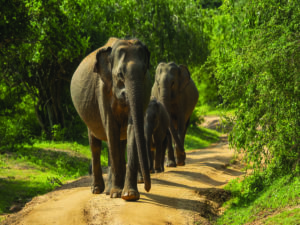Queen Elizabeth II’s record-breaking long reign was exceptional in many ways – not least because England has been ruled by men for most of the last thousand years. Until recently, the crown was passed to the monarch’s eldest son and daughters were married off to royals in other countries.
 But in most other social mammals, females commonly remain and breed in their birth groups, inheriting the status and territory of their mothers while sons leave to find unrelated partners elsewhere.
But in most other social mammals, females commonly remain and breed in their birth groups, inheriting the status and territory of their mothers while sons leave to find unrelated partners elsewhere.
Social relationships between resident females vary but are often supportive. For example in African elephants, females assemble in family groups and older females are usually dominant over younger ones. Overt competition is rare and relationships between matriarchs and younger females are relaxed and supportive.
Elephant matriarchs act as reservoirs of information about where to find food and water and their presence is particularly important in times of famine or drought.
Where species live in larger groups that include members of several families, as in yellow baboons and spotted hyenas competition for status and resources can be more common and females often support close relatives in clashes with other families.
Daughters frequently inherit their mother’s social rank. All members of some families may be consistently dominant to others, often enjoying higher breeding success and survival as a result.
Murderous mothers
But females aren’t always tolerant or supportive. In the meerkats that I have studied in the Kalahari Desert in southern Africa for the last 30 years, one dominant female monopolises breeding in each group, producing up to three litters a year for up to ten years. Their daughters and sons initially remain in their mother’s group and help to feed and protect their younger siblings.
Queens go out of their way to prevent their daughters from breeding successfully. Early in my career, I was astonished to see one of my favourite meerkat queens emerge with blood on her muzzle from her group’s sleeping burrow, where her eldest daughter had just given birth.
This meerkat queen was pregnant at the time.
She went back down and soon emerged with a dead pup that was still warm – then returned and brought up three more pups that she had just killed.
My team’s later work showed that one of the most common causes of pup death was infanticide by pregnant females and studies of several other social mammals have revealed similar trends.
Killing your own grandchildren may not sound like a recipe for evolutionary success, but it often makes sense for pregnant female meerkats.
If groups can only rear a small number of pups, queens will increase their genetic contributions to future generations if they suppress pups that will compete with their own offspring.
Daughters share 50% of their mother’s genes while grandchiLdren only share 25%, so it is in the queen’s best interests to make sure that their groups raise their daughters rather than their granddaughters.
When the daughters of meerkat queens are three to four years old, they become potential rivals to the queen and she evicts them from her group.
As members of other meerkat groups don’t allow emigrating females to join them, evicted females either found new groups with wandering males or (commonly) die in the attempt.
When a queen eventually dies, the other females in her group fight to inherit her position.
The oldest and heaviest female usually wins, taking over the queen’s status, breeding role and territory before starting to evict her sisters.
Walkabout sons
And what about the queen’s sons? In most mammals, mating with a close relative creates weaker and less healthy babies and reduces the breeding success of females. So female meerkats avoid mating with their sons, brothers and other relatives.
Males are usually less particular about who they mate with because they do not pay the same costs of raising young.
However, where the females in their group are relatives and won’t mate with them, they need to leave their birth groups to find willing partners.
Unlike females, male meerkats voluntarily go walkabout, either replacing males in other groups or shacking up with evicted females and attempting to found new groups.
A similar tendency for females to avoid breeding with close relatives and for males to leave their birth groups to find willing partners elsewhere is common in many other mammals – including many species where males are substantially larger and stronger than females, like lions and baboons.
Contrasts in succession
But females don’t always stay at home – and males don’t always wander.
There are some mammals where the situation is reversed. These include a number of bats, horses, monkeys – and all three African apes.
For example, female gorillas often leave their birth groups to breed in other groups while males may stay and breed there, inheriting the breeding position from their fathers.
A feature of many these species is that resident breeding males or groups of related males hold their positions for relatively long periods – longer than the age at which most females reach sexual maturity.
So one explanation is that females need to leave their birth groups to find unrelated breeding partners. Males in these species don’t need to leave as immigrant females willingly mate with them.
A preference for male succession is widespread in many human societies and is often attributed to the need for monarchs to be battle leaders and the greater strength and fighting ability of males.
However, African apes are our closest living relatives and they all form groups where females leave but males remain.
This suggests dispersing females and resident males may have been the ancestral norm in hominin societies too.
If so, it may be because females dispersed to avoid inbreeding, rather than because of differences in strength and fighting prowess between the sexes.
(The Conversation)



